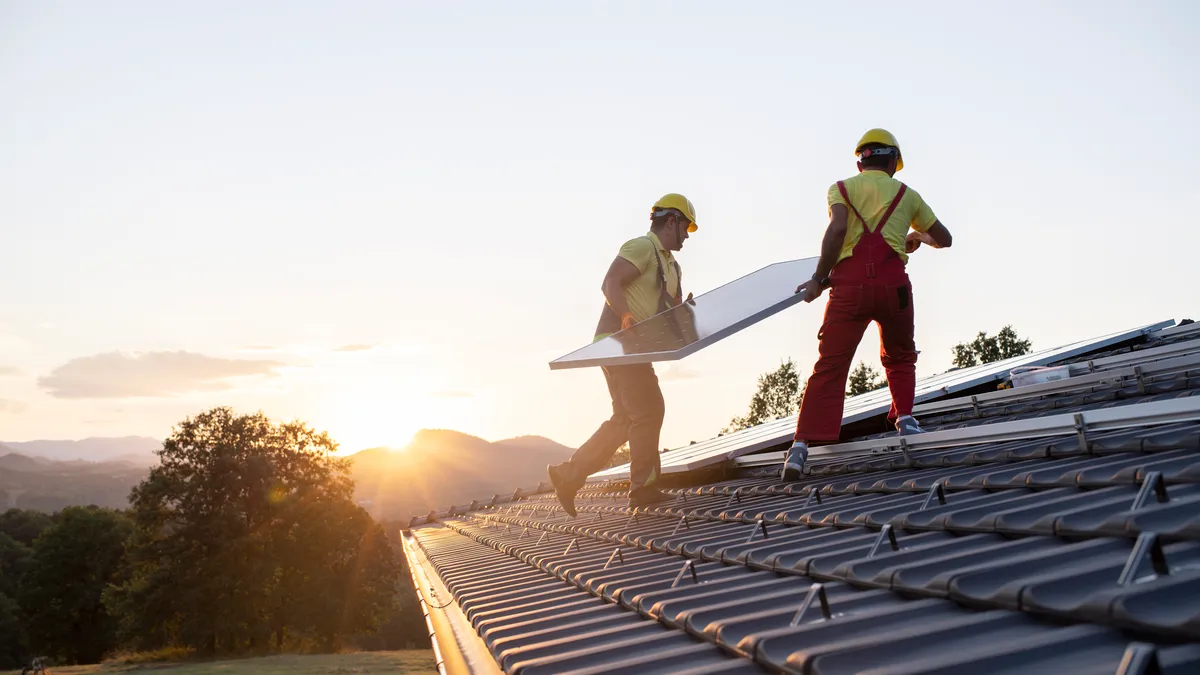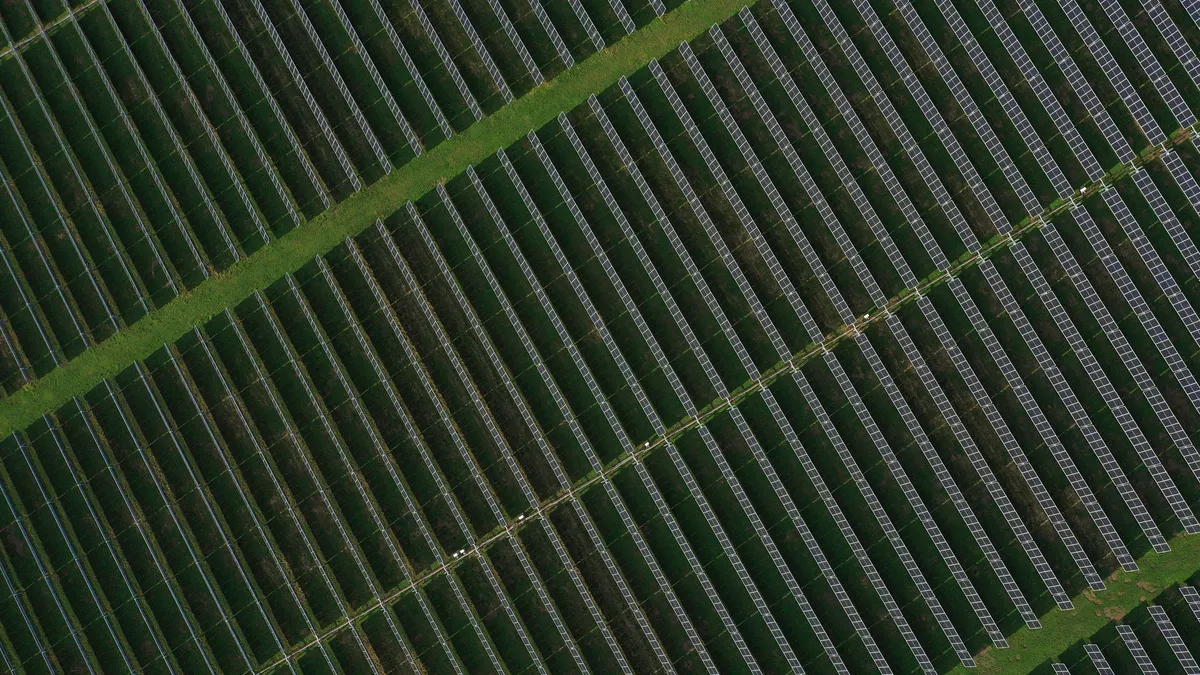Hanwha Q Cells has become the most recent solar manufacturer to announce a sizable investment in the U.S. solar supply chain after the 2022 passage of the Inflation Reduction Act, pledging to spend $2.5 billion on expanding its manufacturing operations in Georgia.
The South Korean company will expand one plant to 5.1 GW of annual production capacity from 1.7 GW while opening a second plant that will produce 3.3 GW annually.
Scott Moskowitz, Qcells’ head of market strategy and public affairs, told Utility Dive that the company is looking to capitalize on demand for solar modules generated by solar tax credits in the IRA, while compensating for a simultaneous global supply crunch.
Global solar module supply spiked in uncertainty for U.S. importers in 2022 following the passage of the Uyghur Forced Labor Prevention Act — which resulted in border seizures of solar module shipments — and the U.S. Department of Commerce’s investigation into potential tariff violations by the makers of imported solar components.
The uncertainty of global supply combined with the manufacturing tax credits in the IRA has given QCells additional incentive to invest in building out the domestic supply chain, though Moskowitz said the company had already been weighing an expansion. QCells is a subsidiary of South Korean industrial group Hanwha Corp., and the backing of a large multinational helped provide the confidence needed for such a steep investment.
Utility Dive spoke to Moskowitz about the factors behind the company’s Jan. 11 expansion announcement, the near-future for the solar industry and how the more efficient tunnel oxide passivated contact, or TOPCon, technology for solar panels is increasing its market share, competing with passivated emitter rear contact, or PERC.
TOPCon technology increases the conversion efficiency of panels it’s applied to, allowing the panel to convert more total energy per square inch. QCells currently produces both TOPCon and PERC panels, calling its Q.ANTUM line “the most mature PERC technology” — but the company appears to be shifting its focus to TOPCon. In May, QCells announced an expansion to its existing Georgia facility, and said that the new factory would produce only TOPCon panels.
The following interview has been edited for clarity and brevity.
UTILITY DIVE: What were the biggest factors influencing this investment?
SCOTT MOSKOWITZ: For a couple of years now, we've been talking quite a bit publicly about the really strong need to invest in additional manufacturing, to focus on building out the supply chain broadly.
I think the industry has been really hungry for a robust, reliable and steady stream of products. Demand has certainly exceeded the supply of solar panels available to the U.S. market for several years now. So we have been focused on working toward some of the investment that we just made.

There have been various steps to get here. We built our first factory in the U.S. back in 2018 in Dalton, Georgia, we invested in REC Silicon at the end of 2021. [In April 2022], we announced that we had begun an expansion of our Dalton facility from 1.7 gigawatts to 3.1, and now we're able to see the rest of this investment take shape as a fully integrated supply chain that includes domestic manufacturing of ingots, wafers and cells, because there are currently no such facilities in the United States. For us, this is part of a big, long-term vision. The U.S. is our biggest market and has been for some time, and now we're able to really make some landmark manufacturing investments that are going to help to further supply and grow this market.
UTILITY DIVE: How was that decision influenced by the Inflation Reduction Act?
SCOTT MOSKOWITZ: It plays an enormous part. That bill includes incentives specifically for manufacturers. It includes a long-term extension of the investment tax credit, it includes credit adders for domestically produced products. Demand was already extremely high and there had already been supply chain issues that folks were really committed to solving. So the IRA puts fuel onto the fire and creates a really strong opportunity in the sector moving forward.
UTILITY DIVE: Did the IRA speed up Qcells’ plans to expand?
SCOTT MOSKOWITZ: I think every company has been looking at making these types of investments for a long time. The supply chain has always been really complicated and we as an industry have needed these types of investments for a long time. I think [the IRA] finally gives folks the confidence and ability to make the ultimate determination to do that.
UTILITY DIVE: Over the next few years, as solar imports remain uncertain, will a complete domestic supply chain be vital to the industry being able to move forward with solar projects in the U.S.?
SCOTT MOSKOWITZ: Qcells has a diversified supply chain – we manufacture in the U.S., Korea and Malaysia and these [domestic] investments are going to take some time to build. We've already got the existing facility in Dalton. That one's been under expansion since the middle of last year, but the new facility in Georgia is going to take around two years to construct and make operational. So the market is going to proceed along and hopefully that will help it grow further, once these facilities come online in a couple years.
UTILITY DIVE: What technological innovations in solar modules is Qcells embracing?
SCOTT MOSKOWITZ: These factories will be completely state of the art. They will be highly automated, highly advanced facilities that ensure that they are able to produce products on a globally competitive basis. And from our perspective, they're gonna be making the most advanced panels that we make anywhere in the world. Qcells was a pioneer in PERC technology – our Q.ANTUM technology has been on the market for a long time – and the next evolution is going from PERC to TOPCon, which is certainly the path that we're on. R&D is also central to who we are as a company, we're always focused on what the next product transitions are going to look like. But the big picture issue is that we want to maintain flexible market demand. So we'll always ensure that our factories are responsive to what the market is looking for, and what's going to be the most attractive product of supply.
UTILITY DIVE: How do you see TOPCon developing? Will it share the market with PERC, or take over?
SCOTT MOSKOWITZ: I'm not a product expert, but generally speaking, I think most folks see it as sort of the natural evolution of PERC technology, and the next way to get added efficiency out of the bankable, reliable technology that's on the market. There are a lot of variations in crystalline silicon cell and module technology out there. You've seen lots of industry transitions in the past, from multi- to mono-crystalline, from full cells to half cells. We're always looking at, ‘What is going to be the right combination of product characteristics to create the best products out there?’ So whether that's PERC, TOPCon, P-type, N-type, we're always going to be exploring that.
UTILITY DIVE: Do you see any particular benefits from being a multinational company headquartered in South Korea?
SCOTT MOSKOWITZ: From our perspective, it's created a really strong global focus – a strong focus on partnering with suppliers and customers around the world. And being part of a big multinational also really helps us to stand out as a company that is going to be around for a long time. We're a reliable partner to companies. We are as bankable as it gets. And that helps us to have confidence in making big investments for the future.






















